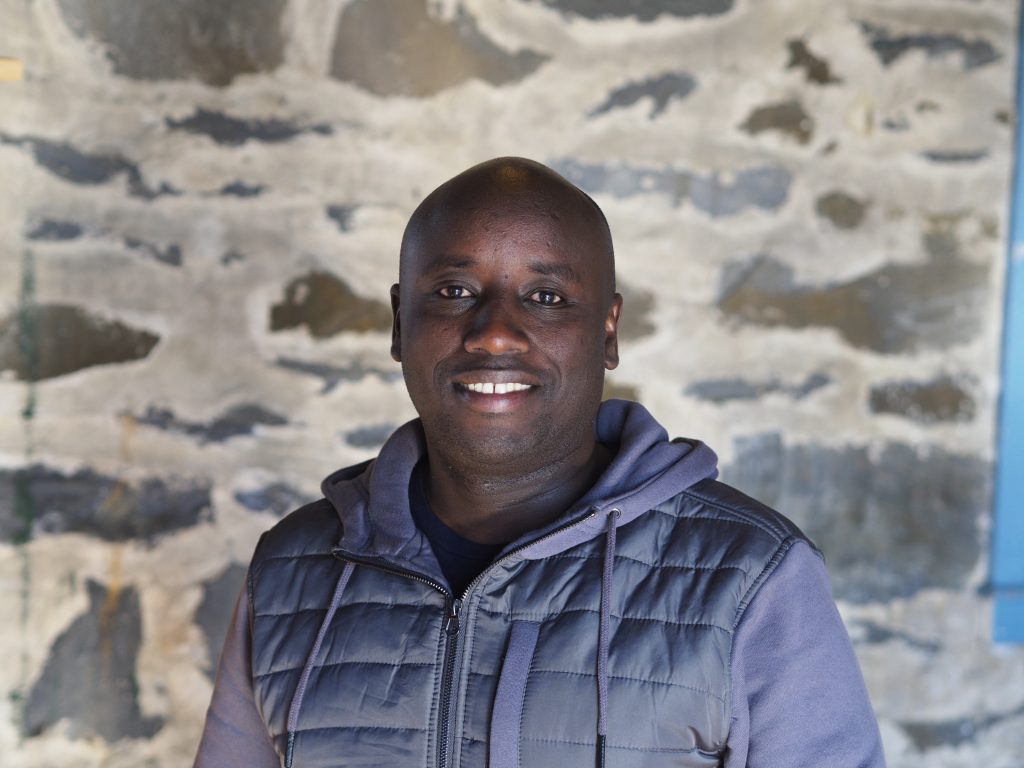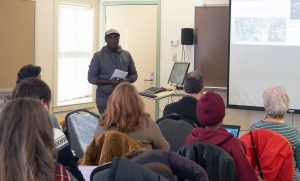Breaking the Pattern: A conversation with refugee scholar Kenneth Mukonyezi
December 12th, 2018 | SIT Graduate Institute

After the completion of courses, SIT students end up all over the world for the practicum phase of their degrees, working and researching in their fields. During Capstone Seminar week, those students gather in Vermont to present that research and mark the end point of their studies. This week, Kenneth Mukonyezi is among them.
Kenneth comes from rural Uganda and was a member of the Ugandan People’s Defense Force. His assignment with the Presidential Guard Brigade brought him into contact with Ugandan opposition leaders, whose pro-democracy views offered a powerful counterpoint to the corruption and abuses he saw in the administration of Uganda’s leader, Yoweri Museveni, in power since 1986.
“I realized that the hardships I faced as a child were the same challenges my parents faced,” he says. “And those were the same challenges my child was likely to face unless we broke the pattern.”
In 2014, Museveni’s government cracked down on members of the military who were sympathetic to the opposition, and Kenneth was detained and tortured, his family harassed and threatened. Kenneth eventually escaped his detention and came to the United States as a refugee seeking asylum, but he was forced to leave family members behind . When, in 2016, SIT offered scholarships to refugee students, Kenneth joined the peace and conflict transformation degree program, aiming to eventually return to Uganda to put his degree into practice.
At his Dec. 12 capstone presentation, Kenneth said, “When I arrived here [at SIT], I realized there is hope. I can start afresh … I started questioning, thinking about humanizing my enemy. Why would people do this? I realized it is few people who perpetuate violence, not the whole society…. I considered the aspect that I still owe society a lot, rather than the few who perpetuate violence.”
Kenneth is still seeking asylum in the U.S., a long and complex process. In part because his own journey brought him into regular contact with refugee organizations in the Boston area, he pursued a practicum and a capstone project that involved those organizations. For his practicum, he worked with Most Mira, a youth-centered organization fostering opportunity and community for youth in Bosnia-Herzegovina across the ethnic divides that linger from conflict; and Tufts University School of Medicine, where he researched programs for refugees and asylum seekers in Africa.

“I put aside my own struggles as an asylum seeker [to do my practicum],” Kenneth said. “I consider myself more a survivor than a victim.”
Kenneth’s capstone research examines the nature of assistance for refugees and asylum seekers in the U.S. with an eye toward how it can be improved. “With the local politics of the U.S. portraying immigrants as terrorists, a lot of the focus of assistance has been for the short term. I was more concerned about the larger question – is there is a better and more efficient alternative approach that would offer long-term well-being after resettlement? That would ensure empowerment rather than refugees being looked at as dependents.”
From Kenneth’s point of view, SIT is doing its part to ensure empowerment of people in circumstances like his. “The diversity of SIT is such that it’s more like a family than just a school. As a peacebuilder, I got the skills I so wanted. I was happy that those skills were mixed up with transformational approaches and mixed with a strong social justice element.”
Kenneth is already applying what he learned in his home country, even though he cannot, for now, return. He’s part of the steering committee for the Rwebisengo Center for Transformation and Justice. He hopes he can eventually return to be part of that organization’s work with communities in the rural Rwebisengo region to help them assess needs and advocate for themselves with Uganda’s central government.
Right now, Kenneth says, many communities find themselves awaiting whatever assistance might arrive. The organization hopes to create a different model based on informed research, one in which communities define their own needs, then “own the issues, own the challenges, and gain the skills to help solve the issues.”
Kenneth explains that most of Uganda’s population is young and educated, but largely unemployed. Organizations like the Rwebisengo Center aim to help the unemployed create their own opportunities. If a community wants to bring business to town, for instance, how does it do that in a useful, locally appropriate way?
“The government might come in and train a whole community to be tailors,” Kenneth said. “But if you have a whole community of tailors who are trained to make their own clothes, who’s going to buy the clothes they make? Why not do community training about running [any kind of] business instead?”
SIT gave Kenneth the skills to make those ideas a reality. “It has offered me the kind of life I wanted. I now have a mix of skills in sustainable development and peacebuilding, and those skills are critical to affecting real change.”
